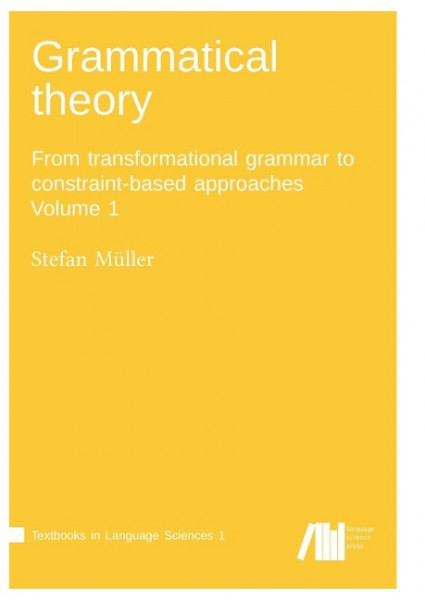
Grammatical theory Vol. 1
Kurzinformation
inkl. MwSt. Versandinformationen
Artikel zZt. nicht lieferbar
Artikel zZt. nicht lieferbar

Beschreibung
This book introduces formal grammar theories that play a role in current linguistic theorizing (Phrase Structure Grammar, Transformational Grammar/Government & Binding, Generalized Phrase Structure Grammar, Lexical Functional Grammar, Categorial Grammar, Head-¿Driven Phrase Structure Grammar, Construction Grammar, Tree Adjoining Grammar). The key assumptions are explained and it is shown how the respective theory treats arguments and adjuncts, the active/passive alternation, local reorderings, verb placement, and fronting of constituents over long distances. The analyses are explained with German as the object language. The second part of the book compares these approaches with respect to their predictions regarding language acquisition and psycholinguistic plausibility. The nativism hypothesis, which assumes that humans posses genetically determined innate language-specific knowledge, is critically examined and alternative models of language acquisition are discussed. The second part then addresses controversial issues of current theory building such as the question of flat or binary branching structures being more appropriate, the question whether constructions should be treated on the phrasal or the lexical level, and the question whether abstract, non-visible entities should play a role in syntactic analyses. It is shown that the analyses suggested in the respective frameworks are often translatable into each other. The book closes with a chapter showing how properties common to all languages or to certain classes of languages can be captured. The book is a translation of the German book Grammatiktheorie, which was published by Stauffenburg in 2010. The following quotes are taken from reviews:With this critical yet fair reflection on various grammatical theories, Müller fills what was a major gap in the literature. Karen Lehmann, Zeitschrift für Rezensionen zur germanistischen Sprachwissenschaft, 2012Stefan Müller¿s recent introductory textbook, Grammatiktheorie, is an astonishingly comprehensive and insightful survey for beginning students of the present state of syntactic theory. Wolfgang Sternefeld und Frank Richter, Zeitschrift für Sprachwissenschaft, 2012This is the kind of work that has been sought after for a while [...] The impartial and objective discussion offered by the author is particularly refreshing. Werner Abraham, Germanistik, 2012 von Müller, Stefan
Produktdetails

So garantieren wir Dir zu jeder Zeit Premiumqualität.
Über den Autor
Stefan Müller studied Computer Science, Computational Linguistics and Linguistics at the Humboldt University at Berlin and in Edinburgh. He worked at the German Research Center of Artificial Intelligence (DFKI) in Saarbrücken and for the company Interice. He worked as acting chair for German and Computational Linguistics in Jena and for Theoretical Computational Linguistics in Potsdam. He had an assistant professorship in Bremen for theoretical linguistics and computational linguistics, a full professorship for German and General Linguistics at the Freie Universität Berlin and is now professor for German language with specialization in syntax at the Humboldt-Universität zu Berlin. His main research topic is German grammar. He works both empirically and theoretically. Topics of interest are morphology, syntax, semantics, and information structure. He published mainly about German, but he also works on other languages as for instance Mandarin Chinese, Danish, Maltese, and Persian. The theoretical work is carried out in the framework of Head-¿Driven Phrase Structure Grammar (HPSG) and the theoretical analyses are implemented in computer-¿processable grammar fragments. The grammar fragments that are implemented in the CoreGram Project use a common core. One goal of his research is to understand language and to find out what languages in general and certain language classes in particular have in common.

- Hardcover
- 184 Seiten
- Erschienen 1993
- -

- Hardcover
- 396 Seiten
- Erschienen 2014
- Oxford University Press




 bestellen
bestellen



















![Discovering Syntax: Clause Structures of English, German and Romance (Studies in Generative Grammar [SGG], 93) Discovering Syntax: Clause Structures of English, German and Romance (Studies in Generative Grammar [SGG], 93)](https://d3k2uuz9r025mk.cloudfront.net/media/image/4c/e2/93/1727336083_217964707423_200x200.jpg)










